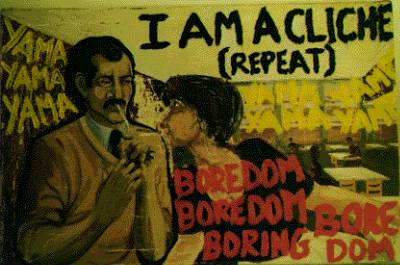Amen
Richard Beck: “5.4: Pitchfork, 1995–present,” in the forthcoming n+1.
You know what Pitchfork has always most reminded me of? Ain’t It Cool News.
Yet even the most explicitly political acts of data gathering and collecting, like WikiLeaks, can succumb to a contemporary ideology of the self-sufficiency of information.
n+1 on information and art, then information and anger.
Obituary: n+1

Shit, guys. Apparently n+1 died this week, too. They wrote that thing about learning and college or whatever, right?
(Frankly, those guys were kind of douchey and we’d forgotten to check in on them. Dropped the ball. Yeah, so.)
I don’t know. Maybe send a card to Ben Kunkel’s step-uncle.
UPDATE:
I know I’m supposed to find out when they first published and all that, but seriously. Who gives a shit.
Lassoing Up Tuesday

James Yeh interviews Diane Williams at The Faster Times.
At The Rumpus, Elissa Bassist wonders, have I earned these cliches?
In a belated look at the NYTBR, the great Harold Bloom reviews a book about the history of anti-Semitism in English literature, Adam Kirsch looks at two books about Heidegger, and Rebecca Newberger Goldstein writes a satire on Theory, in the style of Borges.
io9 rounds up 35 titles for “The Essential Posthuman Science Fiction Reading List.”
The Nation has a new website! Learn about what’s different here, and about their decision to open source here. Kudos and congrats, guys!
Speaking of new websites, n+1 has one, too. The present feature is new fiction by Dy Tran “about” donuts.
A new issue of the Home Video Review of Books!
And last but absolutely not least, the new issue of Propeller features an interview with Kevin Sampsell, one with yours truly, a review of the latest Nicholson Baker, and a whole bunch of other treats besides. Check it out.
The Religion Thing
Last week while I was visiting family in Mississippi, I spent more time in church than I have in the past two years. This reminded me that from the age of 4 and 14, I spent roughly 490 Sundays in church excluding occasional sick days. That’s 1,225 hours when you include Sunday school and “fellowship” time. In addition to regular Sundays there were Wednesday night dinners, youth group meetings, confirmation classes, summer Bible school, youth choir practice, choir tours and weekend retreats. I’m estimating that about 3,500-4,000 hours. Yikes!
But what effect does all this Jesus have on one’s writing? I can’t speak for everyone who has had this kind of upbringing, but for me, church-going led me directly into writing. Prayer led to journaling; journaling led to disgraceful poetry; disgraceful poetry led to disgraceful fiction, then to essays and memoir and more fiction. But church also instilled a reverence for narrative and the inclination to analyze and obsess over stories and books (first books in the bible, of course, but then others.)
Just in time for Christmas, N+1 posted this video of their panel discussion titled Evangelicalism and the Contemporary Intellectual and it’s pretty interesting, though the title is slightly misleading. (It’s not just about Evangelicalism, which is a very particular corner of Protestantism, but about growing up in the church in general.) READ MORE >
Hipster Autophobia

Hipster Tilley by Johnny Zito
I’m tired of hipsters saying they hate hipsters. Every time I read some rant on how hipsters suck I realize I’m reading it in a journal or website written by and for hipsters. Self-hating narcissistic hipsters somehow think they are immune to the vague and broad fallacies of hipsterdom. What deepens this ingrown pathology and paranoia is that self-denying hipsters often subconsciously enjoy being called hipsters, because in some weird way it’s a compliment. This is not a defense of hipsterdom, but an afriendly suggestion that maybe we’re all in the same goddamn pond.
Hipsterdom’s got something do to with an impenetrable irony which results in shallowness, affectedness, smugness, etc. — but aren’t those just judgment calls, like things people have been calling other people forever? Jane Austen and Evelyn Waugh’s been calling out people like that for ages. Hipsterdom may be a new word, but pettiness is timeless.
The question, then, is why novelists have ceded their ground to science. And from the writer’s perspective, if not from the reader’s, an allegorical interpretation of the neuronovel does seem possible. Is the interest in neurological anomaly not symptomatic of an anxiety about the role of novelists in this new medical-materialist world, which happens also to be a world of giant publishing conglomerates and falling reading rates? Are novelists now, in their own eyes and others’, only special cases, without specialized and credentialed knowledge, who may at best dispense accurate if secondhand medical (or historical or sociological) information in the form of an entertaining fictional narrative? And is the impulse to write not an inexplicable compulsion, a category of disorder outside the range of normal?
n+1 presents One More Time: The Britney Symposium

I’m not sure if anyone’s irony-sensors have triggered alarm bells already, but if they are, you should manually disable the system and give this thing a fair shot. (Also, when you have a minute, do yourself a favor and look up the definition of the word irony.) Like everything n+1 produces, the Britney Symposium is erudite, funny, and concerned–for better or worse–with an absolutely earnest engagement with the world.
February 8th, 2009 / 8:55 pm

